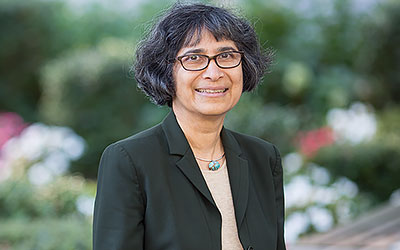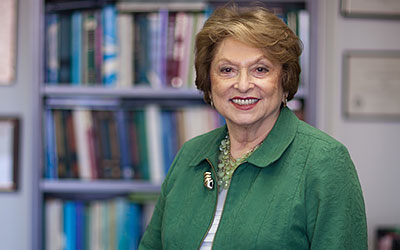Diet Drinks and Stroke
Diet Drink Consumption Linked to Higher Stroke, Coronary Heart Disease, and Death Risk in Post-Menopausal Women
February 20, 2019—(BRONX, N.Y.)—A study led by Albert Einstein College of Medicine researchers found a link between daily consumption of multiple diet drinks and higher stroke risk among post-menopausal women. The association was stronger in obese women and African-American women. The study was published February 14 in Stroke, a journal of the American Heart Association.

Yasmin Mossavar-Rahmani, Ph.D.“Many well-meaning people, especially those who are overweight or obese, drink low-calorie sweetened drinks to cut calories,” said lead author Yasmin Mossavar-Rahmani, Ph.D., associate professor of epidemiology and population health and a registered dietician. “Our research has shown that these drinks may not be as harmless as previously believed.”
The Einstein researchers found that women over the age of 50 who drank two or more artificially sweetened beverages a day were 23 percent more likely to have a stroke and 31 percent more likely to have a stroke caused by a clot, or ischemic stroke, compared to women who either drank no or less than one artificially sweetened beverage per week. The investigators focused on clot-based strokes and one of its subtypes, small-artery occlusion. Previous studies have shown that repeated strokes in smaller blood vessels are also a risk factor for dementia.

Sylvia Wassertheil-Smoller, Ph.D.Of particular note, the study found that high consumers of diet drinks who were obese and had no history of stroke risk factors, such as heart disease and diabetes, were twice as likely to have stroke from a clot. The risk was four times higher for African-American women who were high consumers of diet drinks with no previous heart disease or history of diabetes. Additionally, high consumers were 29 percent more likely to develop heart disease, defined as a fatal or non-fatal heart attack, and 16 percent more likely to die from any cause, compared to the low consumers of diet drinks.
Dr. Mossavar-Rahmani and her colleagues studied data from the Women’s Health Initiative (WHI), a long-term National Institutes of Health-funded study on post-menopausal women. Einstein has been a clinical site for WHI since its inception, the only one in New York, and is led by principal investigator Sylvia Wassertheil-Smoller, Ph.D., senior author of this study and distinguished university professor emerita of epidemiology and population health. The WHI collected self-reported information from a racially diverse population of 81,714 women aged 50 years and older who answered questions on their consumption of diet drinks (12 fl. oz low-calorie, artificially sweetened fruit drinks and sodas) over a three-month period. Health outcomes were tracked for an average of nearly 12 years.
“Our research has shown that these drinks may not be as harmless as previously believed.”
– Yasmin Mossavar-Rahmani, Ph.D.
“While this is an observational study and cannot prove cause and effect, the findings need to be further explored,” said Dr. Mossavar-Rahmani. “More research is necessary to determine what aspects of diet drinks are harmful and what mechanisms may be related to these health risks.”
“Our study should not put women in a panic if they consume a diet soda only occasionally,” Dr. Wassertheil-Smoller added. “But it is prudent to try to wean oneself off these drinks. The excess risks of high consumption of artificially sweetened beverages are relative to no or small consumption. The actual absolute risks to any one individual are still small.”
The study is titled, “Artificially Sweetened Beverages and Stroke, Coronary Heart Disease, and All-Cause Mortality in the Women’s Health Initiative.” Other authors include: Victor Kamensky, M.S., of Einstein; JoAnne E. Manson, M.D., Dr.P.H., of Harvard Medical School; Brian Silver, M.D., of University of Massachusetts Medical School; Stephen R. Rapp, Ph.D., of Wake Forest University School of Medicine; Bernard Haring, M.D., M.P.H., of University of Würzburg, Germany; Shirley A.A. Beresford, Ph.D., University of Washington; and Linda Snetselaar, Ph.D., University of Iowa.
Other Top Stories
9/11 World Trade Center Exposure Linked to Heart Disease Among NYC Firefighters
On Becoming a Physician: New Einstein Students Receive White Coats and Stethoscopes
Novel Therapy for Acute Migraine Shows Promise in Phase 3 Clinical Trial
First Complete Wiring Diagram of an Animal's Nervous System
Multimillion Dollar NIH Grant to Help Reduce Opioid Use & Get Care to People Who Need It
NIH Grant Funds $23 Million Study of Diseases Affecting People Living with HIV
New TAILORx Data Guides Adjuvant Therapy in Younger Breast Cancer Patients
Einstein Celebrates Its 61st Commencement
Bolstering Biopsies: Testing Patients' Individual Cells to Guide Treatment



Tablet Blog